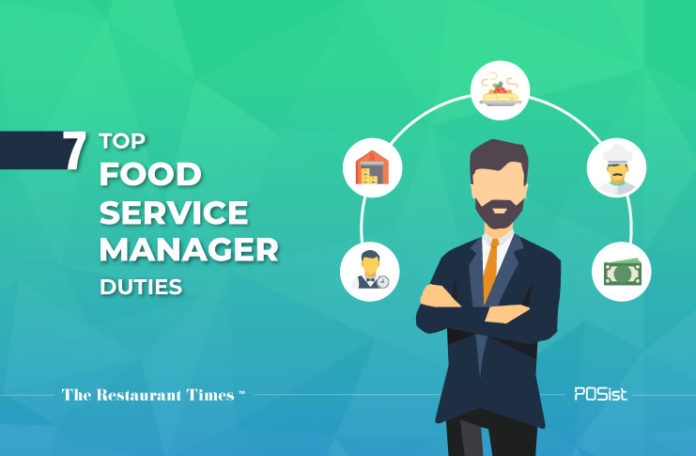It is impossible for a restaurant owner to be present in the restaurant all the time, and hence he needs to look for a competent employee who will take care of all the activities in his absence. Here comes the importance of having a food service manager.
A restaurant manager essentially overlooks the preparation of food and beverage services and delegates the important tasks to the supervisory staff. They are responsible for ensuring that the customers are satisfied with the dining experience and that the restaurant is enjoying high profitability. A food service manager is an essential link between the owner and the restaurant staff.
In the USA restaurant industry when the competition is massive, it is essentially important to have an efficient restaurant manager. He is the one who would ensure the seamless operation of your restaurant which will keep you ahead of other competitors in the US market.
Major Duties Of A Food Service Manager
Once you have a competent food service manager on board, your work as a restaurant owner will be half done. However, before hiring a food service manager, ensure that the person is capable of performing all the duties that are expected from him.
1. Managing The Restaurant Staff
Employee management is one of the most important duties of a food service manager. It is his duty to see where there is a need for more resources in the restaurant. And as per the requirement, he then starts looking for potential restaurant staff to get on board. He decides the entire interview process and the final decision of hiring staff is bestowed upon him.
After hiring restaurant staff, it is the foodservice manager who decides on the training process. This manual will come in handy when a restaurant staff faces a conflict or a sticky situation on the floor of the restaurant.
A food service manager arranges for comprehensive training sessions both for the new and the old employees as well. This will not only help the new ones to understand the working of the restaurant, but it will also help to refresh the memory of the old employees, or when it is needed to get them acquainted with the new things that you bring about in your restaurant.
The restaurant industry in the USA is notorious for high employee attrition rate. It is estimated that the labor turnover rate in the US is almost 70%. As per a recent study from Cornell’s School of Hotel Administration, the cost of losing and replacing one hourly employee can be as high as $5,864. Considering that the turnover rate is 70%, one can only imagine how much restaurants lose out their money. This makes training exceptionally important, which will eventually help the restaurant in employee retention.
A food service manager should also monitor the performance of every staff in the absence of a restaurant owner. He should be the one creating the performance metrics of every staff, following which the owner should give away rewards, and appraisals to the best-performing ones and provide words of encouragement to the others. If the food service manager comes across employees who have been consistently underperforming, then it is his responsibility to take the final call of having him on board.
2. Managing Inventory, Ordering Supplies, And Checking Equipment Regularly
Considering that it is the raw materials that keep the restaurant going, it is the responsibility of the manager to manage inventory rather well, to ensure that the kitchen never runs out of an important stock on a busy hour of the day.
He should also ensure that no item is over purchased that has the potential of generating unnecessary kitchen waste, which will increase the overall expense of the restaurant exponentially. An efficient food service manager should keep a keen eye on the beginning and the closing inventory that will help him understand if any misappropriation is happening behind his back.
Managing the bar inventory is also important, simply because the items there, are extremely expensive. Make it a custom that no liquor bottles will be taken out of the inventory in the absence of the foodservice manager. This will help you control the theft and pilferage in the bar inventory section to a great extent.
Apart from this, Vendor Management is something that a food service manager should supervise rather closely. He should not depend on just one vendor, on the contrary, he should get in touch with multiple vendors, and check the quality and the price of each of getting. After a thorough analysis, he should finalize the ones who are most suitable for the restaurant.
Equipment is something that keeps the restaurant going. And this makes it all the more important for the foodservice manager to check the equipment religiously, and call for regular servicing. He should also keep checking the market to be aware of the new innovative machines, which if you get on board will optimize your kitchen operations immensely.
3. Supervising The Food Preparation and Overall Presentation of Food
A food service manager is responsible for all the dishes that go out of the kitchen, and hence it is one of his major responsibilities to monitor the food preparation and presentation. The executive chef always sets a standard way of preparing and presenting a dish, and this is exactly what the food service manager has to keep in mind. In addition, he has to ensure that all the kitchen staff is diligently following the portion control techniques that will save the restaurant from incurring unnecessary expenses that can bleed the restaurant dry.
4. Ensuring That Food Safety Standards And Regulations Are Maintained
In order to ensure that your restaurant business goes on unhindered, it becomes more than imperative for you to check if all your restaurant staff is following the food and safety regulations laid down by the food authority of the country.
Not following the food safety guidelines can not only land the business in legal trouble but also invite a lot of negative publicity if your restaurant premises and food are not up to the mark.

5. Scheduling The Staff
Staff scheduling is an art that not all food service manager is able to master. However, keeping the rush hours in mind and scheduling the staff accordingly is immensely important. Many a time, restaurants prefer to run with limited staff, that that is the case, then during the time festivals, it is the foodservice manager who gets on board, part-time restaurant employees who help the permanent staff to manage the restaurant festive rush well.
6. Maintaining Budget And Payrolls Effectively
The restaurant owner allocates budget for the various sections of the restaurant. And it then becomes the responsibility of the foodservice manager to ensure that the budget is not exceeded. From buying raw materials, equipment, and crockery, maintaining the equipment, to paying the staff everything should be included within the budget. The food service manager should keep some budget aside for miscellaneous expenses that a restaurant might incur suddenly.
7. Maintaining The Customer Service Standards
It will be extremely difficult for restaurants to retain customers unless the restaurant delivers exceptional customer service especially in the competitive restaurant industry of the US. It is imperative for restaurants to ensure that the restaurant staff is trained to deliver the optimum level of customer service. From welcoming the customers and getting them their desired tables, seamless order taking, serving them within the expected time, and not making them wait for enough for generating the bills, the food service manager should ensure end-to-end customer satisfaction. Once you have satisfied your customers only then you can expect to see them back at your restaurant.
Technical Skills
Food service managers need some fundamental technical abilities in addition to knowing how to determine costs, budget for supplies, and manage staff to ensure the restaurant is successful. These technical skills are necessary for operating the POS system, managing the inventory, and cashing orders on the computer.
How to Create a Job Description for Food Service Manager
Here are some tips to help you create the perfect job description for a food service manager at your restaurant:
Write the Job Purpose
The first part of a job description is a summary of the job and what role it serves in your restaurant. The job purpose gives an insight into the role, degree, and scope of responsibilities. It is usually three to four sentences long and provides a basic understanding of the role or a bird’s eye view.
It is a short answer to the question – Why does the job exist? Clearly outline the tasks and responsibilities of the job so that people looking for work can decide if they are qualified or if the job is right for them.
Mention the Job Responsibilities
Before you start writing your food service manager job description, you should plan to spend a good amount of time on the section about the job responsibilities.
This section is not only the first thing a job seeker looks at, but it also plays a big part in getting rid of people who aren’t qualified.
This is where the applicants will learn about the day-to-day tasks of the job and find out if they have the skills to do those tasks.
Highlight the Specifications
When you look at the requirements for the qualifications and skills section, you might think it will be easy to write. It’s the shortest part of the job description for a food service manager, and it summarizes the applicants’ qualifications, such as the relevant education and work experience they need to get the job.
In the same way that a list of job responsibilities weeds out people who can’t do the job’s daily tasks, a list of qualifications and skills will help you ensure that applicants meet the standards set by your upper management.
Once you have an efficient food service manager on board, you can rest assured that your operations will run smoothly. From managing the staff to ensuring that your operations don’t exceed the expected budget, to having a full-house of happy customers, everything will be exactly as per your expectations. And this will help you in increasing your sales and bolstering the profits of your restaurant.


















This is educative for I have learned on the responsibilities of a food service manager